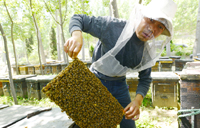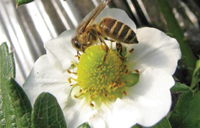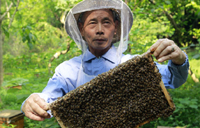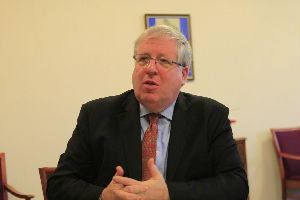Honey, it's all organic
Updated: 2013-10-24 10:47
By Sun Ye (China Daily)
|
|||||||||||
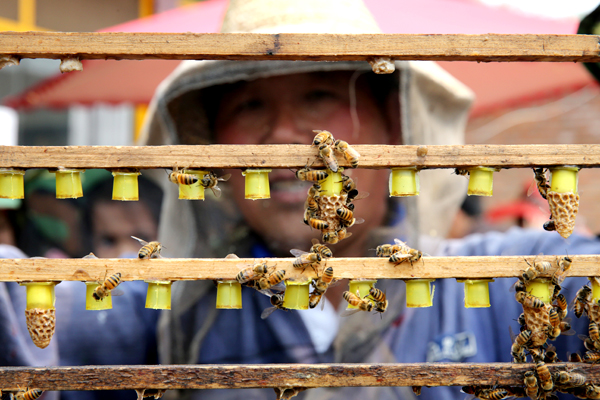 |
|
Song Xuezhou shows how to make bee milk. [Photo by Jiang Dong/China Daily] |
Being a beekeeper is more than just gathering liquid amber when the hives are full, It is making sure colonies of bees are getting along, and that the little insects are happy and contented. Sun Ye talks to suburban honey gatherer Song Xuezhou.
Beijing is not all about urban high-rises, historical sights and gridlocked traffic producing alarming levels of high particulate pollution. It is, fortunately, also home to a growing group of people who are dedicated to producing good, wholesome food that is safe from pesticides and chemical fertilizers.
In the outer suburb of Tongzhou, Song Xuezhou is one of a number of honey gatherers who roam the countryside so their bees can produce honey that is "pollution-free and all natural".
The 60-year-old retired welder has just returned from gathering caragana honey in the Renjianhuahai mountain area in suburban Miyun county. This year, he took about 70 beehives with him, driving a truck into the mountains with a tent, a tank of gas, a supply of rice and noodles and other daily necessities. He stayed for a month.
Song pitched camp away from the nearby village for fear that his bees would become agitated and sting people. He also made sure he was at least a few kilometers away from other honey farmers so there would be plenty of nectar to go around.
"A villager would send water up to me and I sometimes bathed in the river," Song says. "It's difficult living up here."
But he usually has little time to dwell on the inconvenience. The flowering season in July is very busy, with the day starting at 5 am.
"You have to extract the honey before the bees begin working. They are diligent workers themselves."
Bees constantly fly back and forth between the camp and patches of flowering caragana shrubs, and each hive produces about 40 kg of honey each season.
An experienced beekeeper has a trick to motivate the bees even more.
"The secret is to leave the right amount of honey in the hive - not so much so that the bees stop working but enough so they know you are pleased with their work."
Song also monitors the well-being of each little colony.
"I watch if the queen bee gets challenged, and watch to see who could take its throne, who's thinking of splitting the colony, which bees are going on strike and which bees have the stronger genes.
"It's natural selection," he says. "And I get to know them from my years of experience."
Related Stories
Ham and honey 2012-09-17 14:30
A spoonful of Tibetan honey 2012-06-27 10:41
Jolie promotes 'In The Land Of Blood And Honey' 2012-02-15 15:52
'Blood and Honey' 2012-02-12 09:07
Jolie's directorial debut 'Blood and Honey' 2012-01-12 09:41
Today's Top News
Vice-premier calls for strengthened EU ties
EU asked to ease visa restrictions
Beijing discusses ban on idling motor vehicles
PMI heads for 7-month high
Ban to help protect kids from sexual predators
Court upholds verdict of Bo Xilai
Returnees are 'seed capital' for startups
Samsung's response fails to satisfy users
Hot Topics
Lunar probe , China growth forecasts, Emission rules get tougher, China seen through 'colored lens', International board,
Editor's Picks

|

|

|

|

|

|
